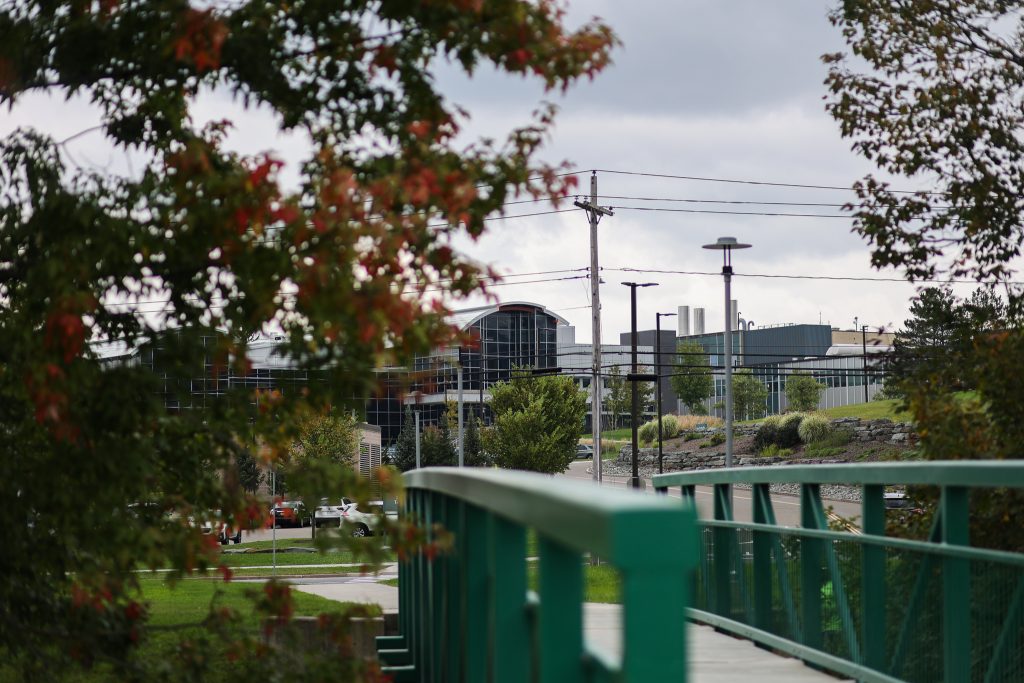Binghamton University will receive a $1 million grant from the state to develop research and careers in the electronics industry.
U.S. Sens. Chuck Schumer and Kirsten Gillibrand announced on Friday that the grant will allow the University to purchase additional packaging equipment for the Nanofabrication Laboratory (NLAB), a cleanroom facility for nano-scale research. The equipment will be used for research and to prepare undergraduate and graduate students for careers in the semiconductor packaging industry. The grant was awarded as a part of the CHIPS and Science Act, a 2022 bipartisan bill spearheaded by Schumer that allocated $280 billion for American industry — focusing particularly on semiconductor manufacturing.
“As chip manufacturing continues to grow in the Southern Tier and across upstate New York, it is vital to invest in workforce training to ensure students are well-prepared to succeed in the semiconductor industry,” Gillibrand said in a press release. “This federal funding will ensure that [BU] can do just that, allowing the school to purchase cutting-edge packaging equipment to make sure students are properly trained in cleanroom environments.”
Semiconductors, or microchips, are used in many devices — including smartphones, computers and medical equipment — to conduct electricity and the product’s needs. The grant will provide the NLAB with equipment to manufacture and test semiconductors, creating training opportunities for students.
NLAB is part of the University’s Small Scales Systems Integration and Packaging (S3IP) Center of Excellence, an interdisciplinary research collective focused on electronic manufacturing. S3IP and NLAB will use the funding to create training opportunities through certifications, courses and micro-credentialing programs.
About 100 people will receive job training from NLAB, according to a University statement. Approximately 20 faculty and 60 graduate students will also benefit from the grant, as the additional equipment will assist with research projects supported by the facility. Bahgat Sammakia, S3IP’s director, the University’s vice president of research and a distinguished professor of mechanical engineering, said the funding will help create a more skilled workforce and promote the semiconductor industry.
“The workforce we need can only be a reality with improved opportunities for training,” Sammakia said. “Experience working with this state-of-the-art equipment in a cleanroom environment will give students a big boost when they enter the job market, and manufacturers in New York state and beyond will be able to recruit talented workers who have relevant expertise that can help their companies grow and thrive.”
The grant represents a continuation of Schumer’s efforts to provide funding to the University and its research initiatives. In January, Schumer announced that the University-led New Energy New York coalition will receive $15 million in 2024 for battery manufacturing research and will be awarded up to $160 million over the next 10 years. Schumer also designated BU a Federal Tech Hub last October under the CHIPS legislation.
Schumer has been vocal about his focus on expanding economic opportunity in upstate New York, using the CHIPS and Science Act to encourage electronic manufacturers to invest in the region. Micron Technology, a memory chip manufacturer, announced in 2022 that it would invest $100 billion into a Syracuse site over the next 20 years — an investment Schumer encouraged.
“I wrote the CHIPS & Science Bill with upstate NY as my north star, and Binghamton is seeing the benefits firsthand with millions in investment from semiconductors to batteries, and this is only the beginning,” Schumer said in the press release. “Together with fantastic institutions like [BU] leading the way, we are ensuring the next generation of engineers, scientists and innovators are trained and work here in upstate [New York].”
University President Harvey Stenger expressed optimism that the grant will create more opportunities for students and that the University recognizes its role and responsibility in workforce development.
“Equipping our laboratories with the latest tools gives our students and our industry partners an important advantage,” Stenger said. “I’m grateful for [Schumer’s] continued partnership, and I look forward to seeing our cleanroom serve as a learning space for our own undergraduates as well as high school and community college students from the region.”



